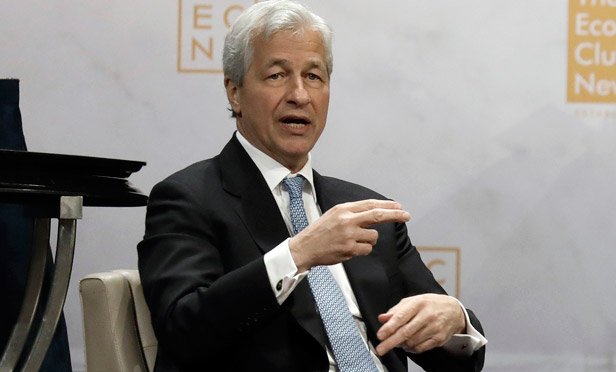 JPMorgan Chase CEO Jamie Dimon. (Photo: Bloomberg)
JPMorgan Chase CEO Jamie Dimon. (Photo: Bloomberg)
Leaders of the biggest financial companies are getting more optimistic about an economic rebound as the pandemic lockdown eases, but they say recent stock gains might have overshot reality.
"The market is assuming that we're not going to see a severe second wave or third wave" of Covid-19, and that treatments will become available to cushion the impact of new outbreaks, BlackRock Inc. CEO Larry Fink said Wednesday at a virtual industry conference. "I do believe jobs are going to be slower coming back than other people believe."
Stock-market optimism was particularly pronounced this week, with some of the best performers, including Carnival Corp. and United Airlines Holdings Inc., among those hurt most by the pandemic. The S&P 500 has increased 36 percent since March 23, when it reached its lowest point in more than three years.
Signs that economies are starting to come to life and prospects for a vaccine helped fuel the gains, as did upbeat comments from policymakers and business leaders. JPMorgan Chase & Co. CEO Jamie Dimon said some borrowers who requested forbearance are still making payments, and banks could be done adding to loan-loss reserves after this quarter. "You could see a fairly rapid recovery," the leader of the biggest U.S. bank said Tuesday at a virtual conference. "The government has been pretty responsive, large companies have the wherewithal, hopefully we're keeping the small ones alive."
More positive economic data emerged Thursday with Labor Department figures showing states' jobless rolls shrank for the first time during the coronavirus pandemic, a sign people are starting to return to work.
The Federal Reserve has effectively cut interest rates to zero, pumped trillions of dollars into the economy, and announced plans for nine emergency lending programs. At some point, though, the stimulus will come to an end.
"You can't prop up the stock market forever," Dimon said.
Financial stocks have also been among the biggest winners in the latest market surge, with the S&P 500 Financials Index up 17 percent since May 13. Citigroup jumped 29 percent over the period, Morgan Stanley increased 26 percent, and Bank of America Corp. added 23 percent.
The gains contrast with a wave of pessimism last month, when the biggest U.S. banks reported first-quarter earnings and set aside a total of $25 billion for loans they expect to sour. At the time, JPMorgan said gross domestic product (GDP) could decline 40 percent as unemployment surges, while Bank of America forecasted a slump well into next year.
Now, though, investors have been looking past signs of weakness in the economy and focusing on the eventual recovery. Wall Street stocks advanced Wednesday, as Federal Reserve Bank of St. Louis President James Bullard argued the economy may already have bottomed out.
Health Questions
Amid the market optimism, Citigroup Inc. CEO Michael Corbat added his voice to those taking a more cautious stance, pointing to uncertainty about how the pandemic will play out.
"There's still so much unknown about the health challenges and therefore how this will play forward," Corbat said in a Bloomberg "Front Row" interview. "There's optimism there, but I think there's part of that that needs to be cautious optimism."
Likewise, Goldman Sachs Group Inc. President John Waldron said Wednesday that one of the biggest risks facing the economy is that pockets of the virus re-emerge in coming months, forcing sporadic shutdowns of local economies.
A recovery that comes in fits and starts could pose a unique challenge for consumers, Waldron said, especially if government support wanes. That would lead to "a lot more destruction" in consumer credit, he said.
Visa Inc. CEO Al Kelly said his firm is still seeing declines in spending on its network compared with the same period a year ago, but the figures have improved in recent weeks.
The trend helps explain the "tug of war" Bank of America CEO Brian Moynihan highlighted in remarks Wednesday at a virtual conference. Three major economic forces are at work pulling the economy in different directions: unemployment, government relief programs, and low interest rates, Moynihan said.
Even as the bank's interest income slumps, "the good news is we grow deposits and grow loans and overcome that," Moynihan said. "We've just got to get the economy back on track."
—With assistance from Sridhar Natarajan and Lananh Nguyen.
© 2025 ALM Global, LLC, All Rights Reserved. Request academic re-use from www.copyright.com. All other uses, submit a request to [email protected]. For more information visit Asset & Logo Licensing.




